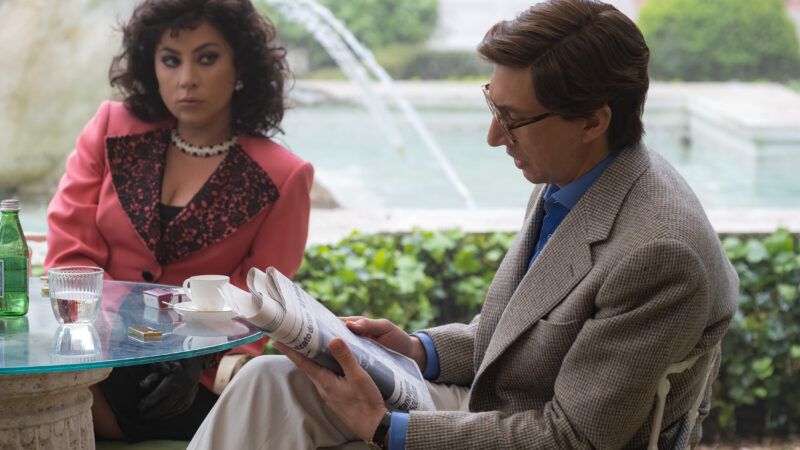Review: House of Gucci
Lady Gaga kills.

If The Godfather had been played for laughs, the result might have been something like House of Gucci. Ridley Scott, the director, presumably had a lot of chuckles left over from his previous film, The Last Duel, which contained not a one, so he's been generous in sprinkling some merriment in here. Unfortunately, there still isn't enough humor to qualify the movie as a full-on comedy, and there's too little action to position it as anything livelier. This tonal ambiguity—especially in a picture with a runtime of well over two and a half hours—diminishes the movie's otherwise highly enjoyable satirical components.
The main cast—which includes Lady Gaga, Adam Driver, and a brilliant Jared Leto (unrecognizable under a layering of pudge-ball prosthetics)—is A-list all the way. Oddly, despite her Sicilian heritage, Gaga deploys an accent throughout the film that sounds decidedly Russian; the rest of the cast, though, revels in a potpourri of faux-Italian natterings that would surely win the Super Mario seal of approval. (This is definitely a feature, not a flaw.)
The story, based on a book by Sara Gay Forden and scripted by Becky Johnston and Roberto Bentivegna, is set amid the acrimonious implosion of the Gucci fashion brand in the 1980s and '90s. Gaga, who already surprised a lot of people with her charismatic performance in the 2018 A Star Is Born, is a knockout playing Patrizia Reggiani, the middle-class girl who married into the Gucci clan in 1972 after drawing the interest of naive young fashion heir Maurizio Gucci (Driver) at a wild disco party in Milan. The Patrizia we see here is a woman of tight skirts and steely resolve, but when a storm cloud of heartbreak moves in on her character toward the end, Gaga delivers the picture's most moving scenes.
Scott's customary costume designer, Janty Yates, has done an impressive job of summoning the fearless sartorial spirit of 1970s-'80s fashions: The picture is a wallow of nerdy Fair Isle sweaters, lavender corduroy bell bottoms, and the kind of outsize glasses that look like windshields for the eyes. There's also wall-to-wall smoking, of course, and judiciously placed period music (Eurythmics, Blondie, Donna Summer)—just enough to establish the long-gone world from which these characters have been plucked.
Adam Driver, effortlessly magnetic, is virtually a straight man in the role of the youngest Gucci, a law student with no interest in his family's high-end fashion business. But he is drawn deeper into the Gucci world by his calculating Uncle Aldo (Al Pacino), who wishes he had a son like Maurizio instead of the one he does have, the idiot Paolo (Leto). Aldo has tacky modernizing plans for the family enterprise, typified by his secret support for the sort of cheap Gucci knockoffs that clog the world's tourist byways (not ripoffs, Aldo insists, but merely "recreations"). Aldo's commercial scheming is disdained by his younger brother Rodolfo (Jeremy Irons in a caterpillar mustache), who also opposes his son Maurizio's planned marriage to the commoner Patrizia. She in turn sees a way to exploit the family's internecine resentments to become a power player among the Guccis herself. Many years later, after being unceremoniously dumped by her unfaithful husband, Patrizia is aided in what soon becomes a lethal plan ("It's time to take out the trash!") by a TV psychic named Pina (Salma Hayek), and menacingly monitored by the family's sleek consigliere, Domenico De Sole (Jack Huston).
As the picture runs on way too long, you can't help wondering why director Scott left in such minimally productive sequences as the one set in the hills outside Florence, where a family cattle farm produces the company's celebrated super-soft leather. You're thankful, however, that he afforded plentiful narrative space for Leto's priceless Paolo, the Fredo of the Gucci clan—a lovable buffoon whose idea of a searing insult is, "You lying sack of potatoes!"
In a festive family celebration set in a sun-splashed courtyard, the director offers a tip of the hat to one of his movie's obvious influences, Francis Ford Coppola's original Godfather. It's a scene that makes you wonder how much more excellent this film might have been had its director not been constrained by the real-life structure of the Gucci story. Coppola's masterwork owed much to the freedom of fiction.


Show Comments (4)